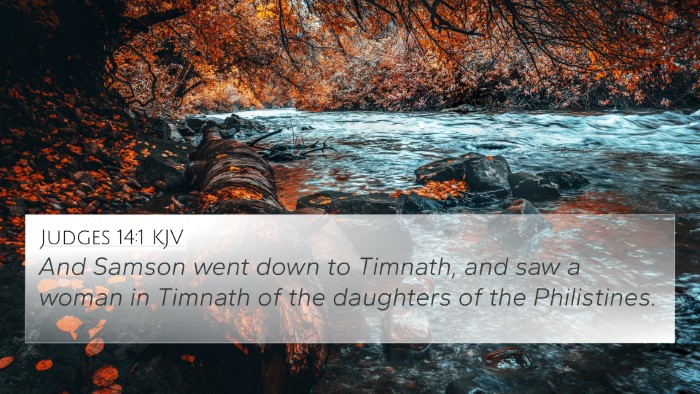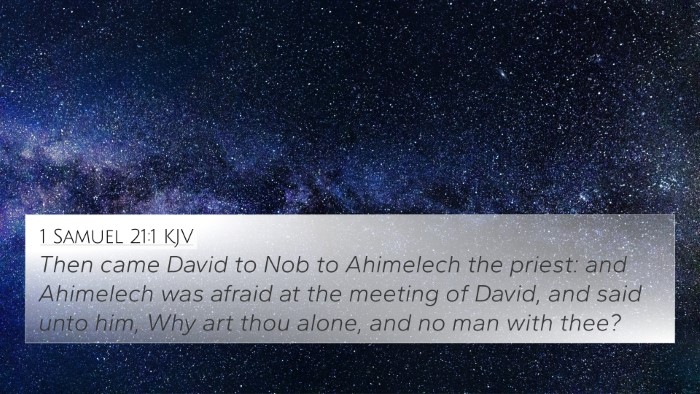Bible Verse Meaning and Analysis: Ezekiel 25:15
Ezekiel 25:15: "Thus saith the Lord God; Because the Philistines have dealt by revenge, and have taken vengeance with a despiteful heart, to destroy it for the old hatred." This verse reflects God's judgment against the Philistines for their hostility toward Israel.
Summary of Biblical Meaning
Ezekiel 25:15 serves as a prophetic declaration of God's impending judgment on the Philistines. Through various public domain commentaries, we see a consensus on several key themes:
- God's Justice: The Philistines are punished for their actions driven by revenge and hatred (Albert Barnes).
- The Historical Context: The animosity between Israel and the Philistines is longstanding, highlighting a pattern of hostility (Matthew Henry).
- Theological Implication: This passage emphasizes God's sovereignty in administering justice to nations for their attitudes and actions against His people (Adam Clarke).
In-Depth Commentary Insights
Matthew Henry elaborates on the emotional undertones of vengeance and the potential consequences of harboring such sentiments. The Philistines' historic enmity towards Israel is underscored as not merely a human rivalry but a divine concern.
Albert Barnes connects this declaration of judgment to the broader narrative of God's ultimate authority over both nations and individuals, stressing that hatred towards God's people raises severe repercussions.
Adam Clarke notes that God's response to the Philistine actions was not arbitrary; rather, it stemmed from their longstanding enmity and desire for destruction of Israel, paralleling other historic instances of divine justice seen throughout the scriptures.
Connections to Other Bible Verses
To further understand Ezekiel 25:15, we can explore cross-references that highlight thematic or narrative connections. Here are notable verses:
- Ezekiel 35:5: Discusses God's judgment against Mount Seir for ancient enmity against Israel.
- Isaiah 14:29: A prophecy against the Philistines during King Ahaz's reign, reflecting judgment on their actions.
- Amos 1:6-8: Condemnation of the Philistines due to similar acts of violence and revenge.
- Psalm 137:7: A lament that reflects the pain inflicted by the Philistines, emphasizing the theme of collective memory of suffering.
- Jeremiah 47:1-7: Prophecies against the Philistines and God's ultimate victory, linking to the prophetic tradition in Ezekiel.
- Micah 5:6: Notes the devastation brought upon the Philistines, connecting God’s judgment immediately after verses of hope for Israel.
- Ezekiel 25:1-7: The broader context surrounding God's judgment on different nations, including Tyre, Ammon, and Moab.
- 2 Chronicles 21:16-17: God's judgments against nations reveal the consequences of sin, where actions against Israel trigger divine wrath.
- Zephaniah 2:4-7: Calls for the judgment of Philistia while simultaneously blessing Israel, illustrating God's justice amidst historical rivalries.
- Matthew 5:38-39: Jesus’ teaching on non-retaliation contrasts the Philistines’ approach and reflects the shift in the New Testament regarding vengeance.
Thematic Connections and Analysis
This verse embodies themes of revenge, divine justice, and historical enmity. Furthermore, the connections can be further analyzed as follows:
- Thematic Bible verse connections: Ezekiel 25:15 demonstrates a continuity of the theme of divine retribution found in both the Old and New Testaments.
- Inter-Biblical dialogue: The reactions and sentiments expressed in this verse correspond to teachings in the New Testament that advocate for love and forgiveness over vengeance.
- Scriptural cross-referencing: These connections affirm a cohesive narrative throughout the Bible regarding God’s dealings with nations and His people.
Tools and Methods for Cross-Referencing
To utilize cross-referencing effectively in biblical study, several tools can facilitate this process:
- Bible concordance: An exhaustive alphabetical list of words and phrases found in the Bible, providing insights into various verses.
- Bible cross-reference guide: A resource that indicates related verses, assisting readers in identifying connections.
- Bible reference resources: Various study Bibles and commentaries that include cross-references to enhance understanding.
- Comprehensive Bible cross-reference materials: Analytical texts that unify different themes across scripture promoting deeper theological insights.
- Cross-referencing Bible study methods: Techniques for exploring the relationships between verses, facilitating themed studies.
User Intent
Many individuals might seek to identify relationships between Ezekiel 25:15 and other Bible verses. Questions that guide this explorative journey include:
- What verses are related to Ezekiel 25:15?
- How do Ezekiel 25:15 and Jeremiah 47:1-7 connect?
- Similarities between Ezekiel 25:15 and Psalm 137:7?
- Find cross-references for Ezekiel 25:15 to support modern-day applications.
Conclusion
Ezekiel 25:15 is a profound reminder of the principle of divine justice against vengeance and hatred. Understanding its implications requires a thorough examination of the historical context, thematic links with other scriptures, and the insights provided by rich biblical commentary. The connections highlighted through cross-referencing enhance our theological understanding and spiritual application of this significant verse.





















